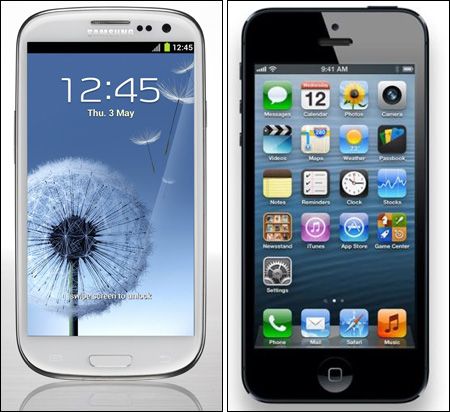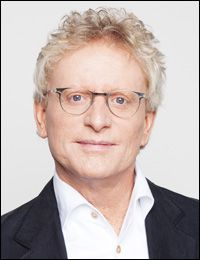Who copied who?
Apple’s copycat argument against Samsung faces backlash
Ever since the patent war between Samsung and Apple began, the simplest but most controversial issue at the legal battle has been whether the Korean firm’s Galaxy series copied features of the U.S. tech giant’s i-branded devices.
Courts, as well as legal experts, have been split over the issue as many believe that it is hard to make a distinction between copying and creating in the rapidly-changing technology sector. Courts in the U.S. have ruled in favor of Apple, while those away from the iPhone maker’s home turf ruled otherwise.
It remains to be seen whether which company will claim victory in the historic patent war but it seems things are turning more in favor of the Korean firm as Apple’s copycat argument is facing a strong backlash from a growing number of global patent experts.
A noted global patent expert said that the validity of Apple’s copycat argument is weak as Samsung has survived in the smartphone war.
“In general, I cannot believe that a technology giant like Samsung who has done so remarkably well in the market for consumer electronics where other companies like Sony and Philips, Nokia and others have failed to maintain market momentum should ever be called a copycat,’’ said Severin de Wit, the founder of the Intellectual Property Expert Group (IPEG) consultancy, in an interview with The Korea Times, Monday.
IPEG is Europe’s first Intellectual Property (IP) related merchant banking and strategy firm located in The Hague, the Netherlands.
According to him, most American and European companies that became giants in their own right start off by looking closely at their rivals, or more exactly, begin by copying but soon become creators themselves.
“Being a copycat alone or remaining a copycat will not help to survive in this highly-contentious and competitive market for consumer electronics,’’ said de Wit, who is also co-founder of IER, one of the Netherlands’ leading IP journals.
He pointed out that technology needs to be credited. Apple is saying Samsung copied the looks and feels of its i-something design, while Samsung argues its “prior art’’ technology was discounted by nine jurors in California, August, which awarded Apple $1.05 billion in damages from Samsung.
“The dollar-per-patent is just a means to get paid for what Apple believes it has created and should be rewarded for. In my view, that has little to do with appreciation for design. A well-designed phone that does not function well is as unattractive as a jewel of technology that has an awful look and feel,’’ he said.
De Wit was a deputy judge in patent cases at the District Court of The Hauge from 1998 to 2002. He oversaw various issues related to electronics patent cases for a large law firm.
When asked the possibility of whether Samsung Electronics will challenge Apple most in the global information and technology industry in a real sense he said, “No doubt about it. Of all smartphones sold in the world, one out of three is a Samsung.’’
But in general, he was rather cautious to comment on the ongoing litigation between the two consumer electronics giants in Europe and the United States. But he said the recent decision by the U.S. Patent and Trademark Office (USPTO), in which the agency nullified Apple’s patent claims on a touch-screen “bounce back’’ feature, will help Samsung gain more legal edges.
“As far as I understand U.S. patent law, I don’t think Judge Koh has any say on this other than that she has to accept that the party granting the patent in the first place, the USPTO, revised its opinion and withdrew the patent. This USPTO decision can be appealed by Apple, but Judge Koh can’t influence that anymore. But it gives legal weight to Samsung’s argument that some Apple patents were initially granted in error,’’ he said.
“Every large patent battle starts with a selection of easy-to-explain patents, preferable user-interface patents, like the rubber banding patent that now is being revoked by the USPTO. It is hard to understand why even courts in one country can disagree among each other whether a party infringes a patent or whether a patent is invalid or not, let alone how the outcomes of the legal battle in different countries affects each party’s position. Patent fights become a jigsaw, leaving both parties at odds what the final result of the patent battle brings them.’’
After recently losing a U.K. court appeal, Apple posted a note on its website saying that Samsung didn’t copy the iPad’s design with its Galaxy Tab tablets. But of course, Apple did this in the “most confusing language possible.’’
De Wit, who’s been in intellectual property field since 1978, said: “Given the amount of publicity every bit of information on this high profile patent battle seems to get, any news of a win of one party over the other creates a new avalanche of blogs, publications, editorials and comments, enough to restore whatever impression the public has over on one of the parties. It only contributes in my view to the irrationality of patent battles and will only enlarge the frustration many feel over this type of IP litigation, asking what, if any, result in the market this type of legal fights have.’’
Judge Koh needs be jurist
Asked if he had any advice for U.S. Federal Judge Lucy Koh, de Wit said, “I wish her all the wisdom in the world, with a couple of million eyes and ears that follow each and every step you make, knowing that in the public eye, you never do it right. Be a jurist and a fine and sharp one.’’
Samsung earlier confirmed it was seeking a new hearing because the August verdict in California had been mismanaged by controversial jury foreman Velvin Hogan.
In a related note, there is a chance for Koh to lower the damages awarded by the U.S. jurors.
“It is my impression that most jury awarded damages are later overturned or dramatically lowered by judges or courts in the United States. Of course, in this highly visible and hugely public patent battle, big numbers like the jury award of over a billion dollar, bodes well for the generally laymen public that follows this titanic struggle. I am sure that things are sure to simmer down over time.’’
Samsung Electronics spokesman Park Han-yong declined to give any updates on its legal stance against Apple for its fight in the United States.
Meanwhile, the former Dutch judge also agreed with the widely held view that the chance of Samsung and Apple signing a cross-licensing is highly-unlikely in the near future.
“Cross-licensing only makes sense for either party if there is something in for both of them. I cannot see that that is the case, unless one party has or will achieve a technological advantage over the other in a technology that is crucial and imperative to maintain market share. I am not familiar with the facts enough to have an opinion on this whether this is the case (or will soon be). In the absence of this I don’t see a cross licensing to happen any time soon,’’ he answered.
Rather, de Wit stressed over 90 percent of electronics and related patent fights eventually end in a settlement, sooner or later. “I am convinced that over time this will be true for the Samsung Apple dispute as well. But it’s too early now for any party to settle.
“The price would simply be too high. There is a risk for Apple though. The more the battle starts to resemble an Emmental cheese (cheese with holes), the less effective Apple’s efforts to draw a public image of Samsung as the copier and Apple to be the innovator, will stick in the public mind,’’ he said. <The Korea Times/Kim Yoo-chul, Cho Mu-hyun>





















































